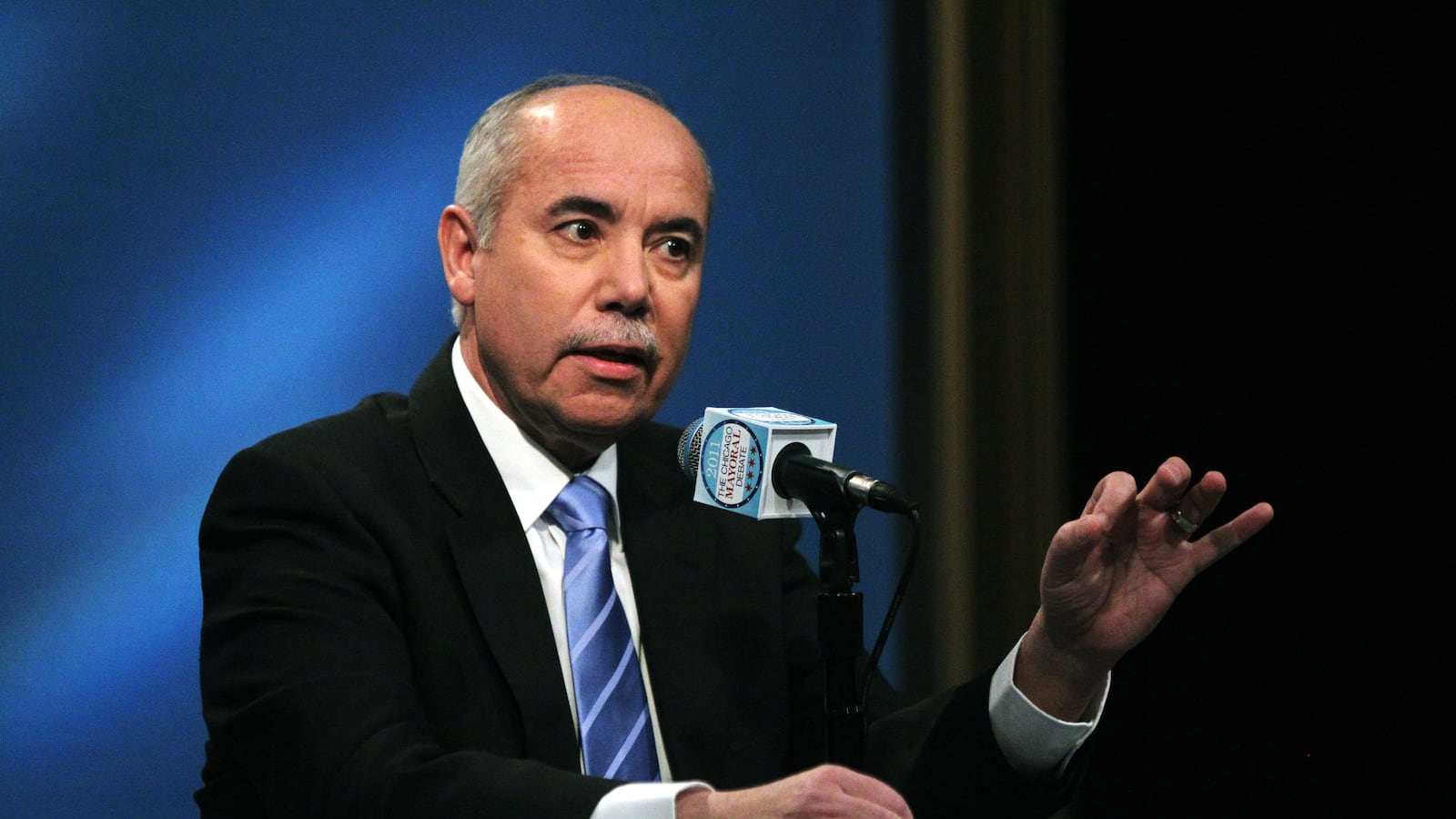Chicago Mayor Lori Lightfoot intends to name former city clerk Miguel del Valle to preside over the city’s new school board, the Sun-Times reported Tuesday.
Team Lightfoot’s response, to the Sun-Times and to Chalkbeat: “We can’t confirm. ”
At a civic event Tuesday, the city’s new mayor said the school district was in the process of vetting her school board selections. Their names would be made public soon, Lightfoot said, but offered no specifics or timeline.
Del Valle — the first Latinx Illinois senator, a one-time mayoral candidate, and a respected leader in the city’s Latinx community — directed Chalkbeat to the mayor’s office when we reached him through a spokesperson Wednesday.
He declined to confirm his appointment when he spoke to the Sun-Times. But he told the newspaper he is prepared for a short-term appointment, while Lightfoot works to fulfill her campaign pledge to shift the board from one appointed by the mayor to one elected by Chicago residents.
“I would feel just fine because I’m a proponent of an elected school board,” he told the newspaper. “It could be two years. It could be three years. It could be four years. But we’re going to get an elected school board. It’s going to happen.”
Del Valle is in some ways uniquely positioned to help Lightfoot make that change. Here are four things about del Valle that could help him — and Lightfoot — if he leads the school board.
He knows how the state legislature works.
Del Valle’s nearly two decades as a state senator would make him a useful ally as Lightfoot learns to navigate Springfield’s complex relationships and rules of operation. She has never held elected office in Chicago, much less in Illinois, and will need lawmakers’ help to accomplish much of what she is setting out to do, from landing additional funding, including relief from the city’s mounting teachers’ pension bills, to fulfilling her school board pledge. (She has called a proposal currently before the legislature a “recipe for disaster and chaos” because it would grow the school board from seven members to 21.).
“Lightfoot doesn’t have any experience down there, and she recognizes the importance of Springfield,” said Christopher Mooney, a professor of political science at the University of Illinois at Chicago who studies Illinois state politics. “She knows she has to deal with Springfield, not only for money, but also for changes that might be needed in procedures and processes.”
While much of the legislature has turned over since del Valle served, the leadership on both party sides has mostly remained intact, Mooney noted. The most powerful figure downstate, the Chicago Democrat Michael Madigan, is the longest-serving state House speaker in U.S. history, holding that position for almost all of del Valle’s time in the legislature.
Del Valle is a respected leader in the city’s Latinx community.
Nearly a third of Chicago’s population is Latinx, but Latinx students now make up nearly half of all public school students. After it became clear that the city’s new mayor would be a black woman, the City Council’s influential Latino Caucus focused on lobbying for Latinx hiring in the winner’s administration. A Latinx school board president would be a powerful early appointment for Lightfoot to make, especially given that she has decided to keep on Janice Jackson, also a black woman, as schools chief. As a trailblazing Latinx elected official who helped found several Latinx advocacy groups, del Valle has the relationships and voice to advocate for Lightfoot’s education policies in Latinx communities — and to represent their concerns to her.<
As Lightfoot promised, Del Valle “won’t need much introduction” to people in Chicago.
In fact, tens of thousands of Chicagoans have already voted for him, in multiple elections where he was a candidate. Del Valle represented Chicagoans in elected office starting in the late 1980s as the first Latinx state senator. He was appointed city clerk in 2006, but the following year he handily beat his opponents in an election, winning more than 244,000 votes. In the 2011 municipal primary for Chicago mayor, he received more than 54,000 votes to come in third place.
He has a range of experiences with the city’s schools and its students.
Del Valle grew up in the city and met his wife at what was then Tuley High School, he told Chicago Magazine in 2011. His four children attended a mix of public, parochial, and private schools — including the Catholic high school that became DePaul College Prep; Lane Tech, a selective public school; and the private Chicago Latin School. He has also served on the board of a state commission that oversees a college grant program for students living in poverty.
As a lawmaker, del Valle sponsored legislation to boost early childhood education and to provide funding for more high schools to offer advanced courses.In an interview after leaving elected office, del Valle said fears he had expressed during his mayoral campaign about the city’s schools had come true, painting a picture very much like the one Lightfoot has promised to change.
“Back then, I talked about how we were developing a dual system of public education,” del Valle told the Chicago Reporter in 2014. “And that’s exactly what’s happening with the dramatic increase in charter schools and the reduction in resources to neighborhood schools.”
He added: “While this administration says we’re developing more International Baccalaureate programs and magnet schools, the fact of the matter is that some of that is being done to accommodate the newer population. I’m not saying that it shouldn’t happen. What I’m saying is there has to be a balance.”


